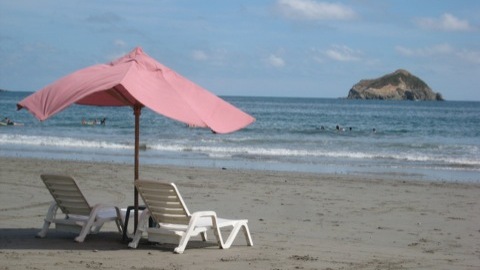I’m sitting in the last scrap of shade in Costa Rica, staring at the Pacific Ocean and watching my friends frolic in the infinity pool. I’m also working, although I’m far from my messy desk in Halifax and the printer that hates me. (It does, and I, in turn, hate it.)
 While this is quite an extreme case of remote working, it’s not unheard of in my professional reality. Sometimes I work from home, in my pajamas in my day job as a digital content strategist. Sometimes I go to the office. Nobody particularly cares when or where I get my work done, just that it gets done.
While this is quite an extreme case of remote working, it’s not unheard of in my professional reality. Sometimes I work from home, in my pajamas in my day job as a digital content strategist. Sometimes I go to the office. Nobody particularly cares when or where I get my work done, just that it gets done.
“Because our work isn’t defined by a place,” says Mark Fraser, executive vice-president at T4G, explaining why my colleagues and I are permitted to work wherever we choose.
“(Our work is) defined by a product, and that product can come to life anywhere, as far as we’re concerned. The concept of office hours is irrelevant, which by proxy can make the concept of office irrelevant, too.”
It’s not a new concept, this remote working, but the growing reality of it is changing the way we do and will live.
This house I’m renting in Costa Rica, for example, sometimes acts as the remote office of Stephen Long. He’s a former Wall Street big shot who now runs his own private equity fund company from Costa Rica and Cape Cod, Mass.
“I just got out of the pool, just dried off,” he says when I call him on Skype just days before leaving Halifax, destined for his house.
Stephen rises early, when the Internet connection — sometimes shaky in this part of Costa Rica — is at its most robust. (Fewer surfers are up and hogging the connection at 6 a.m., apparently.) He has five employees.
“You have to trust in your employees that work gets done,” he says. “(You) have to be willing to allow your employees to grow without you micromanaging.”
Stephen’s wife Karen was the one who helped him realize he could cut the pressure strings of Wall Street and still maintain a successful career while also getting in some sun and relaxation.
First, she urged him to try Connecticut over Manhattan, and when that worked out, she told him: “If you can do your job in Connecticut, I’m sure you can do your job in Costa Rica.”
Stephen urges those considering such a move to look into what they’d need to be successful and comfortable in a remote environment before, say, packing it all in and heading to Belize to set up shop.
“You have to understand that if things don’t go as planned … what is the outcome?” he says. “It’s a balance of the lifestyle that you choose and your risks (such as) family and other people that you have to be concerned about.”
Midway through our chat, Stephen’s Internet conks out and our Skype session ends abruptly.
“Hence the issues with working remotely,” he laughs later, when he’s finally able to call me back.
But Mark thinks we are continuing to move toward a world where technology trumps geography.
“Remote communications will become more pervasive, but more penetrative,” he says. “(We’ll see) higher use of video and ‘always on’ communication, where you’ll have access to your team as if you were in the same room and all you wanted to do was lean over and say, ‘Can you help me with this?’”
When I’m forced to leave this paradise and return to the real world, it’s nice to know it’s one of deadlines and responsibilities and of growing freedoms. I still really hate the office printer, though.
Who knows, maybe someday Stephen and I will be Costa Rican neighbors.
By STEPHANIE McGRATH | Life Online

